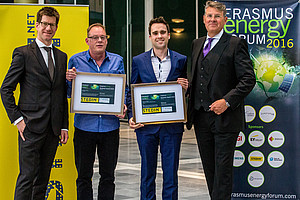Erasmus Energy Business Award for Blue Motion Energy and Geospin

Erasmus Centre for Future Energy Business recognised 2 start-up companies for their effort on innovation, environment, viability and impact. Blue Motion Energy and Geospin received the Erasmus Energy Business Award 2016. The award was presented on Wednesday 18 May at the fifth annual Erasmus Energy Forum in Rotterdam, hosted by Rotterdam School of Management, Erasmus University (RSM). The award was presented by Prof. Wolf Ketter, Volker Beckers and Rick Heerink (not in the picture) to Edwin Schouten and Tobias Brandt.
Urban Data Science for Sustainable Mobility
Geospin; based in Freiburg, Germany, is a data science start-up that supports companies in understanding the spatial components of their data and processes. Using customized Big Data Analytics methods that employ various techniques. “It has high relevance being in the urban energy market,” said the judges. “And it is very much driven on solutions it can strengthen energy information networks”. Building upon several years of research, Geospin links a multitude of data sources – including map data, social media, weather, and crime – to explain drivers of and to predict changes in the demand for particular modes of transportation. The resulting insights have already been applied to the optimal placement of charge points of electric vehicles, which reduced necessary investment costs by more than 15 percent.
Economically viable tidal technology
To generate sustainable energy from ocean current, waves and wind a start-up company named Bleu Motion Energy has developed an efficient rotor technology. With this technology and its benefits to environment, future energy landscape and water quality Blue Motion Energy has demonstrated to be the second winner of the 2016 Erasmus Energy Business Award. Blue Motion Energy is a new Dutch based company that has taken on the challenge to come up with an innovative system to generate energy from under water currents that face tidal influence. Blue Motion technology can increase the efficiency of a marine turbine system by 70 percent. The marine turbines provide a capacity equal to 25 large windmills which is has substantial economic environmental benefits. The world is increasingly looking to the ocean as an energy source and with this innovative system we come closer to realising this opportunity.
Classic energy elements and big data in innovative sustainable solutions
The Erasmus Energy Business Award judges said Blue Motion Energy and Geospin are challenging the future energy market from a different perspective with their modelling and technology. Rick Heerink, jury member and Innovation Manager of the Erasmus Energy Business award sponsor Stedin said: “To build a sustainable energy future, we will have to start relying a lot more on classical elements such as: water and wind. Blue motion is focusing on long term sustainable solutions with use of these elements. Geospin is entering the energy market with data based solutions which will enable the renewable energy market.”
The Erasmus Energy Business Award for the best and most innovative sustainable business idea was presented by Rick Heerink and Volker Beckers, chairman of the Advisory Board of the Erasmus Centre for Future Energy Business (ECFEB), which is RSM’s host for the Erasmus Energy Forum on Wednesday, 18 May 2016. The Erasmus Energy Business Award is sponsored by energy grid network operator, Stedin.
Shortlisted
Three entries made it to the final selection shortlist for the Erasmus Energy Business Award, and were judged on innovation, sustainability, viability and impact. In addition to winners the runner up was;
Norsepower; based in Helsinki, Norway, has designed a spinning cylinder that uses the Magnus effect to harness wind power to propel a ship. When the wind conditions are favourable, Norsepower Rotor Sails allow the main engines to be throttled back, saving fuel and reducing emissions while providing the power needed to maintain speed and voyage time. “Norsepower’s business model can be commercially very attractive. Also they have well-engineered a system with high environmental impact,” said the judges.
Erasmus Energy Forum
Since its inception in 2012, the annual Erasmus Energy Forum event, organised and hosted by the Erasmus Centre for Future Energy Business brought together representatives from a wide range of industries, academia and politics, in front of large influential audiences. RSM plans to organise the 2017 Erasmus Energy Forum on 17 & 18 May.
For more information on about the Erasmus Energy Forum or the Business Awards, please contact Birgit Ros at b.n.ros@rsm.nl.


